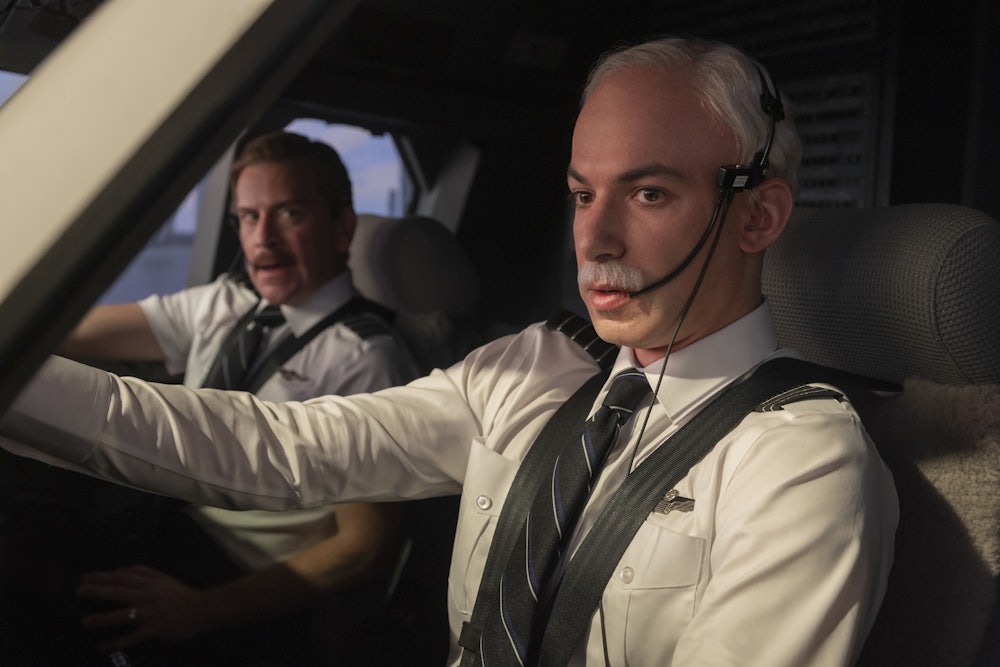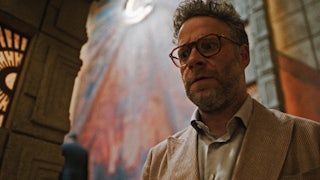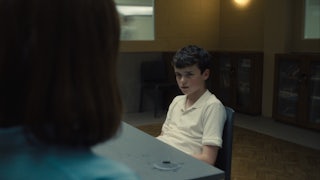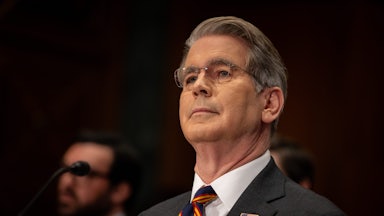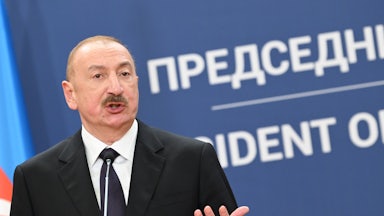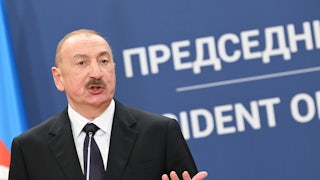My best friend’s little brother is a commercial airline pilot, and I am obsessed with this fact. I am a very nervous flyer, I have no desire ever to fly an airplane myself, and, overall, I have fairly little interest in the romance of human flight, whether it’s between regional hubs in the Southeast United States or between the Earth and the Moon. But the airline industry is fascinating to me. Its occult secrecy, the sheer workaday ordinariness of a job that involves lifting humans into the heavens, the strange stoicism that seems to be common among the pilots you observe wheeling their little suitcases through the airport.
A few years ago, I took my best friend’s little brother out for lunch when he was on a stopover where I live, and I peppered him with questions. His answers did not disappoint. I heard about social rifts between military and nonmilitary trained pilots, about rivalries between airlines—including a fairly detailed and somewhat surprising class hierarchy among service providers—I heard about the lingo, I heard about the dynamic between pilots and flight attendants, I heard about how he had once stepped into a cockpit where the previous pilot, as a joke, had labeled one of the console buttons with a Post-it that said “chemtrails.” As we got up to leave, I told him I thought we should start a podcast to tell people about all of this amazing, humdrum, death-defying workplace drama. I said we could call it Who the Hell is Flying This Thing? He offered a cursory chuckle. He didn’t seem to think it was a good idea.
I thought about that conversation as I watched the second season of HBO’s Nathan Fielder docu-comedy series, The Rehearsal, which aired its hour-long finale this week. Given this season’s intense focus on the darkest, most remote recess of the airline industry—the cockpit—it’s possible Nathan Fielder might think my podcast is a good idea. Or maybe not. For all of the baroque social experiments Fielder designs in order to learn more about the fissures in the airline industry, for all of the rabbit holes he gamely jumps into in order to get inside the psychology of airline pilots, for all the often convincing and passionately argued pleas he makes to powerful people on behalf of airline safety, for all the hours Fielder spent becoming a pilot himself—as we learned this week—I get the lingering feeling that airplanes aren’t the point at all. The Rehearsal is, and always has been, about Nathan Fielder. Who the hell is flying this thing?
Something is going wrong in the cockpit. This is the premise of this season of The Rehearsal. In research Fielder has apparently been doing since the end of the show’s hit first season in 2022, he’s found a troubling trend. Turns out that, in a surprisingly large number of black-box transcripts from major airline catastrophes involving pilot error, there’s evidence that the co-pilot was aware of what was happening but didn’t intervene to stop it. They either stay silent, utter tentative or weak warnings, or have their concerns brusquely dismissed by the captain. And in none of these cases did the co-pilot simply exercise their right to wrest control of the aircraft from the captain whose judgment was impaired. Fielder’s hypothesis—which does not seem wrong—is that lives are being lost because co-pilots feel kind of squicky about standing up to their commanding officers, even when it’s their job to do so. The Rehearsal gets its giant, handcrafted reality-simulation apparatus up and working in order to solve this problem. It’s a perfect scenario for a Fielder joint: cringe, with life-or-death stakes.
The Rehearsal is a unique television program. On the one hand, it is incredibly small-scale in its focus, a show striated with intimate, uncomfortable exchanges and tense silences and strung together with deadpan voiceover. Last season focused on fairly mundane problems: a man who has been lying to his trivia team about having an advanced degree, two brothers in a conflict over their grandfather’s will, a woman deciding whether to have a baby. Season 2 sets its investigations on problems within the airline industry as a whole, but the focus is ultimately not that different from the domestic disputes of the first season. As if to emphasize this, Fielder has transplanted the first season’s replica local bar—the Lizard Lounge—into this season’s experiments. The problem everywhere is truly just a problem of how difficult it is to communicate with other people. In a recent episode, Fielder intoned, “We’re all just people, in the back of an Uber, trying to avoid an awkward conversation,” and I think that’s a terrific thesis statement for the show as a whole.
But even as The Rehearsal is built with a miniaturist’s eye for social detail, it is executed on a grand scale. Fielder, as he brings up repeatedly on-screen this season, has a tremendous, outsize budget for his niche comedy series. And so he hires a cast of thousands, builds gargantuan sets on a whim, leases a 737. Most of the show’s six episodes take place in an exact replica of a terminal at the George Bush Intercontinental Airport in Houston, filled with actors playing the roles of workers and passengers. A comedy that could easily—and would usually—simply follow Fielder around, observing his stilted, occasionally hilarious dustups with ordinary people out in the world, instead expends excessive amounts of time and money to recreate those contingent moments in a laboratory setting.
This season’s experiments have been enthralling, illuminating, even occasionally beautiful. The pilot/co-pilot dynamic is useful to Fielder because it is, at bottom, a relationship. This is the point. Sometimes in obvious ways and sometimes in surprising ways, every “rehearsal” boils down to relationship problems, usually outside the cockpit. There’s the young co-pilot who has a hard time being assertive and ends up having a long-avoided confrontation with his girlfriend in a simulated cockpit. There’s the couple who’ve cloned their dog but don’t feel like they “recognize” their old dog in its replicas. Fielder hires a team of actors to study the couple and try to raise the clone in a simulation of the original dog’s puppyhood, only for the scenes to all devolve into arguments about whether or not to have children. Then there’s Colin, another young co-pilot who is too painfully shy to have a functioning love life. Fielder has a crowd of actors surround Colin everywhere he goes in a “Pack,” mimicking and mirroring his words and behaviors in order to give him confidence. It’s a deeply stupid stunt until, every once in a while, it becomes incredibly moving.
The highlight of the season, for me, is Fielder’s own attempt to inhabit the mind of “Miracle on the Hudson” pilot Chesley Sullenberger. Fielder reads and narratively maps Sullenberger’s autobiography, and then proceeds to act as Sully at various pivotal moments of his young life, including a deeply unsettling breastfeeding scene. The thing that has stuck with me, though, is the production design of Sully’s childhood. In order to produce the correct scale when Fielder plays the pilot as a small boy, the house set is built at enormous size and the actors playing his parents walk on tall stilts under their preposterously sized clothes and operate cartoonish false arms. It’s a kind of surrealist puppetry I found to be among the most visually lovely things I’ve seen on TV in a long time. Comforting, but slightly scary; warm but also sinister. It’s an image of the gauzy formative memories that linger from our own youths. Intimate, yet remote. Fielder spends so much time trying to replicate stuff; it was startling to see him replicate a feeling.
As this list of rehearsals might suggest, while most of what happens in the show starts in the airport, it’s not really about that. In fact, the more the show becomes about the airline industry, the less its insights seem to land there. The show is about Fielder himself, but, specifically, it’s about Fielder as an actor. In the series finale, we learn that he has spent the past several years becoming a licensed pilot. We watch his long journey to master his requirements, to perfect his landings, to accrue the number of hours required. We then learn that he plans to fly a 737, filled with people, alongside a co-pilot, in order to test his theory about cockpit social dynamics. It’s an elaborate stunt, and—like all his stunts—it is not even remotely worth it. He doesn’t effectively test his theory, and, even if he did, he’d already essentially exhausted his options to effect legislation or even industrial policy. But to take the goal of these experiments at face value is to misread the show.
Instead, the whole thing becomes about Fielder’s private—by which I mean known only to us, the audience—concern that he might be on the autism spectrum. A few episodes earlier, in order to get a meeting with a congressman, Fielder meets with an autism organization. The congressman is involved with both the Federal Aviation Administration and autism advocacy. So Fielder uses his show’s resonance with the neurodivergent community—a resonance he gleans from positive reviews and online essays about the first season—to get into the meeting. In the process, though, Fielder (the character on-screen, to be clear) begins to suspect that he might have a diagnosis of his own. He submits to an fMRI prior to the flight and, after landing, seems to dodge the voicemail that would inform him of his diagnosis. It’s a stymied revelation that hovers over the back half of the season. Is this show about Nathan Fielder getting an autism diagnosis?
Whatever the answer, it doesn’t really matter. The idea that the show might lead to a real-life diagnosis for Fielder seems plausible conceptually, but that doesn’t seem like something Nathan Fielder would do, does it? Because the real thing is never as interesting to The Rehearsal as the fake thing. There’s a moment during the Colin sequence when Fielder has built a row of identical sets designed as full-scale replicas of Colin’s apartment. He’s placed a pair of actors in each set playing Colin and Emma, a woman Colin has begun dating. Colin can’t seem to read the signs that Emma wants him to lean in for a kiss. So Fielder has all the couples negotiate this awkward encounter. They all do, they all get over it quickly, and, soon, the row of rooms is just a row of actors making out in pairs. Fielder invites the actors’ significant others to come watch. He hires an intimacy coordinator as the scenes get more intense. Fielder and the show essentially forget about Colin as the focus shifts to the actors and to their boyfriends and girlfriends and husbands and wives who are all seemingly OK watching their partners make out under the guise of “acting.” This fact animates Fielder more than almost anything else on the show. Acting is a strange mystery. The way people inhabit falsehood is considerably more interesting than whatever the truth is that they’re hiding.
In between the two seasons of The Rehearsal, Fielder co-created and starred in the Showtime TV series The Curse. It was his most prominent role as an actor playing a fictional character, a fact Fielder brings up a couple of times in this season of The Rehearsal. The previous season was interested in acting and actors, as well—it introduced the “Fielder Method” of role research as stalking—but this season, it’s almost an obsession. While the final rehearsal falls apart a little as an exploration of social dynamics in the cockpit, it fully holds together as an exploration of the bizarre and unholy sorcery of acting. Fielder makes a tremendous show of getting every actor’s consent to fly on this plane with him—a plane he’s never flown in his life. As he says, “I became the least experienced person licensed to fly a 737 in North America.” What the show wants us to see is their discomfort and their acquiescence. None of these people should say yes, but they do. His explanation of the legal loophole that allows him to charter and fly this plane is at once dazzled and denigrating. “You can’t fly paying passengers,” he explains, but you can fly if “the plane is filled with actors.” It’s a good line because it echoes an old joke about the shallowness and expendability of actors, but it’s also a good joke because of the way it marvels at what acting can and will allow him to accomplish.
While the flight doesn’t solve the cockpit problem Fielder identified at the start, it does demonstrate that problem at scale. Fielder, the least experienced person licensed to fly a 737 in North America, has cast one single person to play themself: the co-pilot. In flight, this co-pilot, despite his obvious terror at the prospect of what they’re doing, rigorously holds to the kind of noninterventionist behavior Fielder saw in all those transcripts, merely because Fielder, a terrible actor, was cast in the part of “Captain.” It’s horrifying to see, but it’s also bafflingly impressive, like a magic trick. “When you practice being other people long enough,” Fielder says in voiceover, “you can forget to learn about yourself.” The Rehearsal’s radical, maybe radically wrong, proposition is that it doesn’t really matter who yourself is. What matters is the role you agree to play.
